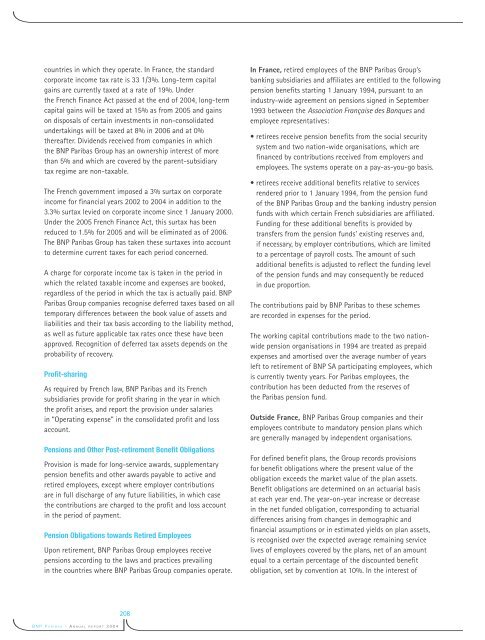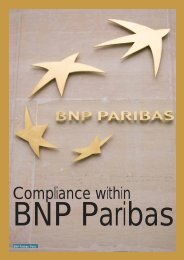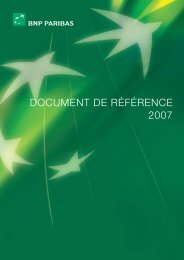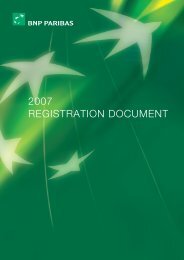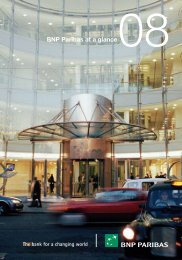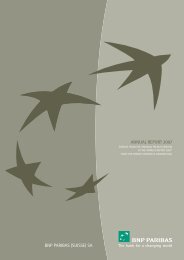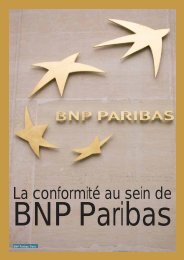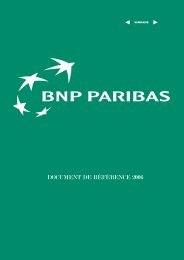La banque d'un monde qui change 2004 - BNP Paribas
La banque d'un monde qui change 2004 - BNP Paribas
La banque d'un monde qui change 2004 - BNP Paribas
Create successful ePaper yourself
Turn your PDF publications into a flip-book with our unique Google optimized e-Paper software.
countries in which they operate. In France, the standardcorporate income tax rate is 33 1/3%. Long-term capitalgains are currently taxed at a rate of 19%. Underthe French Finance Act passed at the end of <strong>2004</strong>, long-termcapital gains will be taxed at 15% as from 2005 and gainson disposals of certain investments in non-consolidatedundertakings will be taxed at 8% in 2006 and at 0%thereafter. Dividends received from companies in whichthe <strong>BNP</strong> <strong>Paribas</strong> Group has an ownership interest of morethan 5% and which are covered by the parent-subsidiarytax regime are non-taxable.The French government imposed a 3% surtax on corporateincome for financial years 2002 to <strong>2004</strong> in addition to the3.3% surtax levied on corporate income since 1 January 2000.Under the 2005 French Finance Act, this surtax has beenreduced to 1.5% for 2005 and will be eliminated as of 2006.The <strong>BNP</strong> <strong>Paribas</strong> Group has taken these surtaxes into accountto determine current taxes for each period concerned.A charge for corporate income tax is taken in the period inwhich the related taxable income and expenses are booked,regardless of the period in which the tax is actually paid. <strong>BNP</strong><strong>Paribas</strong> Group companies recognise deferred taxes based on alltemporary differences between the book value of assets andliabilities and their tax basis according to the liability method,as well as future applicable tax rates once these have beenapproved. Recognition of deferred tax assets depends on theprobability of recovery.Profit-sharingAs re<strong>qui</strong>red by French law, <strong>BNP</strong> <strong>Paribas</strong> and its Frenchsubsidiaries provide for profit sharing in the year in whichthe profit arises, and report the provision under salariesin “Operating expense” in the consolidated profit and lossaccount.Pensions and Other Post-retirement Benefit ObligationsProvision is made for long-service awards, supplementarypension benefits and other awards payable to active andretired employees, except where employer contributionsare in full discharge of any future liabilities, in which casethe contributions are charged to the profit and loss accountin the period of payment.Pension Obligations towards Retired EmployeesUpon retirement, <strong>BNP</strong> <strong>Paribas</strong> Group employees receivepensions according to the laws and practices prevailingin the countries where <strong>BNP</strong> <strong>Paribas</strong> Group companies operate.In France, retired employees of the <strong>BNP</strong> <strong>Paribas</strong> Group’sbanking subsidiaries and affiliates are entitled to the followingpension benefits starting 1 January 1994, pursuant to anindustry-wide agreement on pensions signed in September1993 between the Association Française des Banques andemployee representatives:• retirees receive pension benefits from the social securitysystem and two nation-wide organisations, which arefinanced by contributions received from employers andemployees. The systems operate on a pay-as-you-go basis.• retirees receive additional benefits relative to servicesrendered prior to 1 January 1994, from the pension fundof the <strong>BNP</strong> <strong>Paribas</strong> Group and the banking industry pensionfunds with which certain French subsidiaries are affiliated.Funding for these additional benefits is provided bytransfers from the pension funds’ existing reserves and,if necessary, by employer contributions, which are limitedto a percentage of payroll costs. The amount of suchadditional benefits is adjusted to reflect the funding levelof the pension funds and may consequently be reducedin due proportion.The contributions paid by <strong>BNP</strong> <strong>Paribas</strong> to these schemesare recorded in expenses for the period.The working capital contributions made to the two nationwidepension organisations in 1994 are treated as prepaidexpenses and amortised over the average number of yearsleft to retirement of <strong>BNP</strong> SA participating employees, whichis currently twenty years. For <strong>Paribas</strong> employees, thecontribution has been deducted from the reserves ofthe <strong>Paribas</strong> pension fund.Outside France, <strong>BNP</strong> <strong>Paribas</strong> Group companies and theiremployees contribute to mandatory pension plans whichare generally managed by independent organisations.For defined benefit plans, the Group records provisionsfor benefit obligations where the present value of theobligation exceeds the market value of the plan assets.Benefit obligations are determined on an actuarial basisat each year end. The year-on-year increase or decreasein the net funded obligation, corresponding to actuarialdifferences arising from <strong>change</strong>s in demographic andfinancial assumptions or in estimated yields on plan assets,is recognised over the expected average remaining servicelives of employees covered by the plans, net of an amountequal to a certain percentage of the discounted benefitobligation, set by convention at 10%. In the interest of208<strong>BNP</strong> PARIBAS - ANNUAL REPORT <strong>2004</strong>


